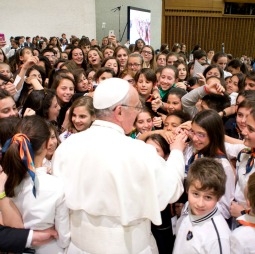28. søndag i det alm. kirkeår (C)
Pope just for a day? No thanks, very sincerely! But just for a Mass – today´s Mass precisely? Francis was elected Pope only a few months ago but his message resounds forcibly throughout the Church and beyond her visible limits. So much so, in fact, that I feel I could almost tell you what he would tell you – tell us rather- today. So much so, actually, that I have decided to tell you what I think he would tell us. The thing is that his voice is probably more important than mine. At any rate, it should be less boring. Let me therefore indulge in a Francician -rather than a Franciscan- reading of today´s Gospel.
Obviously, the episode with the 10 lepers stands out against the other miraculous healings related in the Gospel. Usually, turning to Jesus for healing is described as an act of faith, an act to which Jesus answers with granting salvation. Physical healing appears to be the visible side of an inner, spiritual salvation. In Greek, the verb σῴζω means indiscriminately to rescue, liberate, keep from harm, heal, save. We knock and God opens the door in Jesus – that is the way it goes normally. This does not seem to be the case with the episode of the ten lepers however. Ten out of ten are healed but only one is declared to be saved by Jesus; namely the one who came back to thank the miracle-working rabbi. So what about the faith of the nine others? Did it count for nothing? Why so? Was their faith that much different from the faith of the Canaanite woman, the blind, the paralyzed or simply the other lepers that Jesus healed on his way? Actually, the idea that we are saved on the condition that we would thank God for saving us – that we behave politely as it were – sounds quite strange. Think of a grand-dad who, immediately after giving some sweets to his great children, would snatch the sweets back from their hands on the pretence that he was not thanked warmly enough for his generosity. To put it in more philosophical terms, can salvation be conditional? Is it not per se an unconditional gift of God?
Maybe we should distinguish between granting salvation and receiving it. Granting salvation is the unconditional act of Christ. The ten lepers were healed and saved simultaneously, just as the Canaanite women and their fellow sufferers. However, receiving salvation is a conditional act of those to whom salvation has been granted. Bluntly said, what benefit for a child is there to get sweets in the very unlikely hypothesis he does not eat them? In this sense, one out of the ten lepers actually received what was given to him. ἡ πίστις σου σέσωκέν σε. Your faith has made you well /has saved you” .
I know: one hears little of Pope Francis´ voice in what I have said up till now. But it begins to speak clearer and louder when we apply the wisdom of this episode to the current situation of the Church or rather of the Catholic faithful- to us that is to say. Indeed, what do we usually do or what have we ended up doing with the divinely healing reality of Christ´s salvation, a reality that we come in contact with through and in the Church? Just as the lepers were healed on their way back to Jerusalem or, even more tellingly, just as King Naaman was cured from his disease when he delved into the waters of the Jordan, we have been saved from the fundamental leprosy of sin by being plunged into the waters of baptism. And we delve again and again in this saving flow every time we partake of the Eucharist. In this manner, we receive the means to fight the persisting influence of Adam´s ancient condemnation in us. But what do we make with the prodigious reality of Christ´s salvation? Does the majority of the Catholic faithful – in which number I readily include my poor self- not behave exactly the way the nine lepers did in the episode of the Gospel? We see the gift of God as meant for us and it is so indeed. Naturally, we take the gift back home with us and consume it the “French way” as it were, for the sole purpose of our private spiritual comfort. Some intimacy with God does not spoil the pursuit of our existential plans and strategies. On the contrary, it gives us the precise degree of confidence we need. But who among us thinks that there is more to it or rather that we are missing something essential when we do not even think there could be more to it? Indeed, what about relating to Christ in a purely gracious way, not for the sake of getting something, but for the sake of having received something extremely precious – something vital?
This is not a question of showing some sort of elementary politeness towards our divine benefactor. This is a question of not losing what we have received from him. When we merely consume the gift of salvation for our own benefit, it tends to dissolve in the mass of our daily concerns. Salvation is no longer palpable; it is no longer the agent of an effective transformation of our existence. Some of us react with a growing sense of critical indifference. Has there ever been such a reality as Salvation? Others fall into some sort of semi-conscious spiritual despair. Where is the reality that I once experienced? Have I lost it somehow on the way? Am I out of it forever? Most of us experience a dismal coming and going between critical indifference and spiritual despair.
Now look at the others. Look at the foreigners who stand beyond the limits of the Catholic Church and see what our Pope Francis has been contemplating most of his life as a pastor. See the vibrant evangelical communities that are increasingly prevailing in what used to be an almost entirely Catholic continent, namely Latin America. Consider those whom our Church considers as modern Samaritans because they cannot boast of the spiritual and theological riches of her 2000 year- old tradition. Look at them and tell me why they are so passionate about Salvation. Is it not precisely because they have understood what the ancient Samaritan of the Gospel had understood? There is only one way to fully receive Salvation. It is to give it back to Christ through thank and praise. There is only one way to experience what Christ´s salvation can do for us in a tangible fashion. It is that we start living for Christ in a somewhat radical manner. To praise Christ, to thank him – there is no other way in which we can meet Christ as our true Lord and living God. My Lord and My God- because I am I and what he did for me he did for no one else. Our Lord and our God – because what all of the members of a living Church have in common is that each one of them has acknowledged Christ as Lord and God in a unique manner. “Behold, I know that there is no God in all the earth but in Israel” declares Naaman the Syrian after being cleansed by the waters of the Jordan.
True, the house of the Lord that we identify with our holy, apostolic and Catholic Church is splendid as it stands. It is adorned with all the spiritual, philosophical and artistic riches that have accumulated throughout the centuries. But it could also become a splendid grave or a magnificent mausoleum. All depends on whether the one who is honored within its walls is an idol or the living Messiah that used to pace the roads of Judah and Galilee with a pair of sandals and a staff. If we want our splendid Church to live on, we need to return barefoot, free, unencumbered to the one who gave her to us for the mere sake of thanking him. Actually, I do not need many words to express what I hear Pope Francis telling us. It all fits into one short admonition which, by the way, would make a nice title for an encyclical letter: “Children, let´s get moving!”. We who are the legitimate heirs of Israel, let us stop pretending that we know and that we are better. Instead of sitting anxiously as we observe the less and less deniable signs of our common house´s decay, let us rather stand up and walk close behind the Samaritan as he hurries to give praise to his Savior. We whom the Lord has made so rich, let us do away with clerical hypocrisy and face the fact that we have become poor due to our sins and our selfishness. Only then shall we be able to marvel again at the unconditional and priceless riches that God has entrusted us with. As the apostle says today,” if we are faithless, he remains faithful– for he cannot deny himself”. It is not our own sins that we should fear, but the possibility of them preventing us from giving the testimony of praise without which salvation is no longer a joy to us and a light to others. The apostle also warns us: “if we deny him, he also will deny us“.
There is one word that sums up everything that needed to be said today. It is the name of what we are actually doing together now. A Mass is a Eucharist, that is, the thanking or the praise that we direct towards God through Christ. If we learnt something today, it is that a Eucharist does not merely consist of being granted access to the living body and blood of Christ. It does not either merely end with the final blessing of the priest. After leaving the church, the great thing that remains to do is to return to it. The Eucharist is not complete until we have not personally come back to thank God, and this action of grace, whatever concrete form it takes in our existence, should stand at its very center. We need to do it. The whole Church that we form together needs to do it. “Children, let´s get moving!” – so speaks our Pope if I have correctly heard him today.

